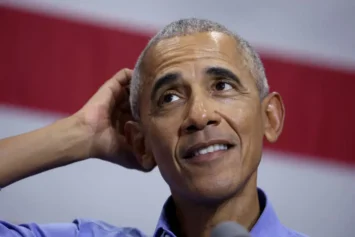President Barack Obama would cruise to a re-election victory over Republican challenger Mitt Romney if the election were held today, according to a Sunday Associated Press analysis of the race.
A lot can still happen in the five weeks remaining before Nov. 6, but the AP breakdown of the current electoral math leaves little doubt that Obama has the upper hand in the bid to reach the 270 electoral votes needed for a second term as the race enters its final stages.
Romney will need a paradigm shift of sorts to help him overtake the president in the nine battleground states where the two men are running the closest.
Recent polls show the president with a steady lead in many of them as Romney looks to shift the dynamics of the race, starting with Wednesday night’s first of three presidential debates in Denver.
“We’d rather be us than them,” Obama spokeswoman Jennifer Psaki told the AP.
But Romney’s running mate Paul Ryan insists there’s time for the GOP ticket to win.
“In these kinds of races people focus near the end, and that’s what’s happening now,” he told “Fox News Sunday.”
If the election were held today, an Associated Press analysis shows Obama would win at least 271 electoral votes, with likely victories in crucial Ohio and Iowa along with 19 other states and the District of Columbia. Romney would carry 23 states for a total of 206.
To oust the Democratic incumbent, Romney would need to take the contested battlegrounds of Florida, Colorado, Nevada, North Carolina, New Hampshire and Virginia, all which would put him at 267 votes, and then upend Obama in either Ohio or Iowa.
The AP analysis was intended to provide a snapshot of a race that has previously been extremely close in the mostly contested states.
In the final weeks before the Nov. 6 vote, Obama is enjoying a burst of momentum and has benefited from growing optimism about the economy as well as a series of Romney gaffes. Most notably, a secret video recently surfaced that showed the Republican nominee telling a group of donors that 47 percent of Americans consider themselves victims dependent on the government.
Romney has seen his standing slip in polls in Ohio as of late, with 18 electoral votes, and Iowa, with six.
Romney is hoping that previously undecided voters tip his way on Election Day. But there are hurdles there, too.
Early voting is under way in dozens of states, and national and key states surveys show undecided voters feel more favorably toward Obama than Romney.
The Republican is in a tight battle with Obama in Florida, as well as Colorado, North Carolina and Nevada.
But Ohio’s shifting landscape illustrates Romney’s troubles over the past few weeks.
Republicans and Democrats agree that Obama’s solid lead in public and private polling in the state is for real. Over the past month, the president has benefited from an improving economic situation in the state whose 7.2 percent unemployment rate is below the 8.1 percent national average.
The president also appears to be in stronger shape than Romney in Virginia, which has 13 electoral votes, and in New Hampshire, with four votes.
Romney also has been forced to spend millions of dollars a week defending himself in North Carolina, a GOP-leaning state that’s more conservative than most of the states that will decide the election.
Polls now show a competitive race there. Democrats boast of having registered 250,000 new voters in the state since April 2011. Obama carried North Carolina by just 14,000 votes four years ago.
Also, Romney’s effort to challenge Obama in Democratic-leaning Wisconsin, home state of running mate Paul Ryan, appears to have fizzled. Despite millions of dollars spent on TV in the last few weeks by both sides, polls show Obama with a clear lead in Wisconsin.
Romney’s goal of forcing Obama to defend Michigan — Romney’s native state — and Pennsylvania never materialized.
“The big strategic moment coming out of the conventions in my view was whether or not Romney and his campaign could succeed in expanding the parameters of the battleground,” said Tad Devine, a top adviser to 2000 Democratic nominee Al Gore and 2004 nominee John Kerry. “They have not been able to do that.”
Time is running out.


